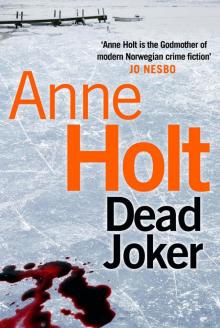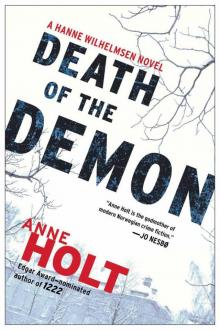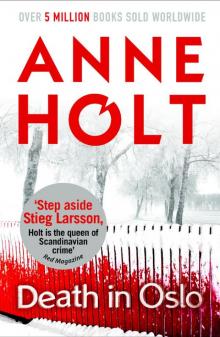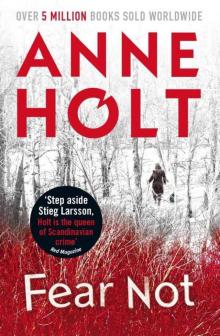Dead Joker Read online
Page 28
She leaned against Hanne, tickling her under the nose with the flower. Hanne smiled stiffly and rubbed her face.
“There’s been a murder,” she said quietly. “Another decapitation.”
Cecilie put her arm around her and felt Hanne’s hair against her cheek. “And Halvorsrud’s out,” she said slowly. “Does this have anything to do with him?”
Hanne shrugged.
“Who knows?” she said, sounding discouraged. “But it seems curious to have two beheadings in one month. I’ve no idea …”
Falling silent, she put her head in her hands. Cecilie haltingly raised herself up in order to kneel behind her. She embraced Hanne and rocked her slowly from side to side.
“It’s Easter Sunday,” she whispered with her lips on Hanne’s ear. “They’ll manage fine without you until tomorrow. Don’t you think?”
Three children aged about twelve suddenly appeared on a rocky crag only ten meters away from them. The girls were whispering and one sniggered loudly with her hand in front of her mouth. Then they were gone, just as abruptly as they had arrived.
“I have to go,” Hanne said, getting stiffly to her feet. “But if you want to stay, I can try to find some time to come for you tomorrow evening. You won’t be able to travel back with Håkon and Karen. It would be too wearing with the children in the car.”
Cecilie clutched Hanne’s hand and began to take shaky steps toward the path beyond the coastal rocks.
“You’re never going to have time to come for me,” she said firmly. “I’ll come back with you now.”
71
It was 8 p.m. on Monday April 5. Hanne Wilhelmsen had barely been home to change clothes that morning and could feel the onset of a familiar headache. Opening her eyes wide, she made an effort to focus on the document Billy T. had delivered an hour earlier. She was grateful that he had never objected to her demand for daily written reports. Most of the detectives felt that the official documents ought to be sufficient and were reluctant to take the time to write personal letters to the Chief Inspector. Hanne Wilhelmsen insisted on it nevertheless, to a chorus of mostly noisy protest. Receiving daily summaries of the countless pieces of information, steadily mounting, which lay in folders and looseleaf binders, helped her to retain an overall picture. Also, in her experience, investigators took greater liberties when they knew what they wrote was not going to be officially recorded, so they aired personal opinions and hunches. Hanne Wilhelmsen wanted it that way, so that was what she got.
She swallowed down two Paracet tablets with lukewarm coffee, and read as she massaged her scalp with her fingertips.
The murder victim is Evald Bromo, a journalist on Aftenposten’s financial section. He was forty-six years old, married to Margaret Kleiven, no children. Never convicted of any crime.
Evald Bromo, like Doris Flo Halvorsrud, had injuries from a powerful blow to the back of the head. Whether that killed him, or whether he was decapitated while still alive, will become clear in the next few days. He was found by the caretaker, Ole Monrad Karlsen, at Vogts gate 14. Provisionally, Karlsen is entirely beyond suspicion. He is surly and difficult, but Sommarøy believes the guy clearly has nothing to do with the incident.
Vogts gate 14 is a block of rented apartments with twenty-four units, many of which are local-authority apartments for tenants on social security. The block itself is in private ownership, which explains why Karlsen is still caretaker long after having reached pension age. Ståle Salvesen rented from the local authority.
Evald Bromo left his home around half past ten on Saturday night to go jogging. He was apparently very fit for his age, and according to his wife there was nothing unusual about such an outing.
His wife went to bed immediately after her husband went out. When she woke the next morning around eight o’clock, there were signs in the house that Evald Bromo had not come home. The provisional time of death is estimated at between midnight and two o’clock on Sunday morning, so this seems to add up. His wife waited for a couple of hours before alerting the police to her husband’s disappearance. She had not wanted to create a commotion in case it turned out that her husband had simply gone out running again. Karianne, who has spoken to the wife, says she seems totally devastated and really bewildered about what has happened. I’ve requested that she be interviewed again tomorrow. On Sunday afternoon it was barely possible to get any sense out of her.
The weapon used to behead Bromo has not been found. Probably a sword of some kind was used. It must have been relatively heavy and extremely sharp. It was a clean cut and the forensic experts maintain that it took no more than two or three blows to sever the head from the body.
It is evident that the door to the basement was broken open, but it is likely that the outside door had been left open. According to what we have learned, it’s a fairly frequent occurrence for the residents to set the latch to the open position. The intercom system’s remote opening mechanism is sometimes out of order and many residents do not want to have to go downstairs to open the door for visitors.
Bromo was in all probability decapitated in the place where his body was found. In any case, he must have been unconscious (if not dead) when it happened. As of now, we have not found any sign of a struggle. There was nothing but ordinary dirt under his nails, and his body had no other injuries apart from the blow to the back of the head and the actual decapitation.
We are keeping an open mind about whether Bromo went down into the basement under his own steam or whether he was carried down. If it was the latter, we are probably talking about a male, very strong perpetrator (or several perpetrators). Neither the staircase nor the corpse bears any sign that Bromo was dragged down to the basement (dead or unconscious). That means he either walked by himself, or was carried. Accordingly, since there were no signs of struggle, the latter seems most likely. Furthermore, it should be added that Bromo was of slim build, six foot tall and weighing only sixty-eight kilos.
In fact, the police had a call-out to the area at three o’clock on Sunday morning. Complaints had been made about a party in the block opposite the crime scene. The patrol did not see or hear anything suspicious at or around Vogts gate 14.
The most remarkable aspect of this case is of course that the body was found in the basement of the apartment block where Ståle Salvesen lived. Even if the murder had been committed by means other than decapitation, such a coincidence would have been striking. When, on top of everything else, we are talking about an execution in the same manner as was inflicted on Doris F. H., then this probably indicates some kind of connection between the killings.
Erik H. and Karl are now investigating whether there are any points of intersection between Evald Bromo and Ståle Salvesen. Bromo’s wife had never heard Salvesen’s name before, so there can’t be any close relationship, at least. At present we do not know anything other than that Bromo covered the story about the investigation into Aurora Data and Salvesen. In other words, it is likely that the two of them met and spoke at some point many years ago.
Naturally, we are also investigating whether there is any link between Sigurd Halvorsrud and Bromo. To date there is nothing to suggest that. Since they both worked on financial crimes, it is highly probable that they at least knew of each other. We’re hauling Halvorsrud in for interview tomorrow. I’ll take care of that myself.
Today, we have conducted a total of six witness interviews. (It has been difficult to get hold of people because of the Easter holidays.) Three were with Bromo’s closest colleagues, who all claim to have known Bromo reasonably well. He is generally described as a relatively quiet, shy man who seldom had much social contact with others. They know little of Bromo’s social circle, but assert that he mainly stayed at home with his wife when he was not out running. Apparently he used to be a very competent long-distance runner. One of the witnesses describes Bromo’s attitude to running as “fanatical”. None of the witnesses can think of anyone who might be out to get Bromo, although they all emphasize that as
journalists, they occasionally have a strained relationship with people they write about.
In a manner of speaking, Ståle Salvesen is a “dead joker”.
It’s about time we initiated an organized search for him. Perhaps we should have done so earlier. The currents at Staure Bridge are such that a body could certainly be pushed down and even become snagged on the seabed. Personally, I don’t think we’ll find anything. My gut feeling tells me that Ståle Salvesen is some place or other, alive and well.
Hanne Wilhelmsen tried to identify her own gut feeling. It told her nothing apart from that she had not eaten for twelve hours.
“Damn it, Hanne!”
Karl Sommarøy charged in through the half-open door and hurled a sheet of paper with two magnified fingerprints onto the desk in front of her. Then he stood beside her with his left arm across her shoulder and his right finger stabbing at the paper.
“Can you believe that?” He laughed his girlish chuckle, slapping his whole hand down on the table.
“Fingerprints, obviously,” Hanne said with a sigh.
She stifled a yawn and considered reprimanding her colleague. Although the door had been slightly open, he should have knocked.
“I see that,” she said instead.
“But who do you think they belong to?”
Breathless with excitement, Karl Sommarøy continued without waiting for Hanne to guess.
“They were found beside Evald Bromo’s corpse. One on a storeroom wall two meters farther along the basement corridor, and one on the wall beside the stairs.”
Her headache had intensified. Something was pulsing behind her right eye, as if a nail had lodged in there and wanted to get out. Hanne pushed her knuckle into her eye socket and pressed hard.
“So who do they belong to?” she said in a disgruntled voice, trying to make him release his grip on her shoulders. “I’m a bit too tired to play games.”
“They belong to Sigurd Halvorsrud!” Karl said, laughing again: high-pitched, reedy and piercing. “Sigurd Halvorsrud has been in Ståle Salvesen’s basement, where Evald Bromo’s body was found. I’m really damn curious about how he’s going to explain that!”
Hanne Wilhelmsen let her fingers follow the fine lines on the enlarged prints in front of her. They curved around one another like contour lines on an old orienteering map. The terrain was unique: of the nearly five billion people in the world, only Sigurd Halvorsrud could have left these marks in the basement where Evald Bromo was murdered. The Chief Public Prosecutor could not talk his way out of that.
72
It was calm as a millpond on the outer Oslo Fjord. A couple of nautical miles south of the Færder Lighthouse, an ocean-going yacht was becalmed with two crew on board. Petter Weider and Jonas Broch were both twenty-five years old and studied law when they were not out sailing. Which meant that they read a minimal amount. In the Easter holidays, which they should have spent poring over their books since exams were just over a month away, they had sailed to Copenhagen for marijuana. Not large quantities – only half a kilo each, exclusively for personal use. A little for friends too, perhaps. Just as a treat.
The return voyage had taken longer than expected. In the middle of the Skagerrak, the wind had dropped considerably. By the time the students caught sight of the Færder Lighthouse on the morning of Tuesday April 6, the sea was unusually calm for the time of year. The sun was blazing in the eastern sky, and they were able to stow their thick lifejackets and sit in the cockpit wearing only their woolen sweaters.
It was a perfect day for a real joint. No point in using their engine when, strictly speaking, they had nothing other than a stuffy reading room awaiting them on shore.
The merchandise they had purchased through an old acquaintance at the University of Copenhagen contained what the advertisement had promised. Petter and Jonas had already forgotten that they had failed their exams twice in a row and that the Student Loan Fund would kick up merry hell if they did not pass this time. The gentle slapping of sails in search of wind combined with the waves lapping around the boat encouraged the boys to look on the bright side of life. If their exams went down the drain this time too, they could always sail around the world. For a couple of years anyway. To Zanzibar at least, where Jonas had been the previous year during the Christmas holidays. And certainly to the Maldives, where they could laze around, traveling from island to island, and maybe even earn some money from tourists who were bored out of their skulls parading around the same little stretch of land.
“There’s a man lying in the water,” Petter said lethargically. “Starboard side.”
Jonas sniggered. “What’s he doing?” he whispered dramatically.
“He’s dead.”
“Completely?”
“Fairly.”
“Have we any more beer?”
Petter thrust his fist into a cooler bag and pulled out a half-liter can of Tuborg. He tossed it to Jonas before opening one for himself.
“The guy’s still there,” Petter mumbled.
“Cut it out.” Jonas sat up straighter and locked the tiller. “Where is he?”
“There!”
“For fuck’s sake! Bloody hell, Petter! He really is dead!”
“That’s what I told you,” Petter muttered, offended.
Jonas leaned over the gunwale and splashed salt water on his face. He rubbed his temples vigorously and gave his head an energetic shake.
“We’ll have to haul him in. Throw me the boat hook!”
Between them, the two students succeeded in grabbing hold of the corpse’s clothes. They dragged the body, heavy as lead, slowly toward the gunwale. The man – for some reason they realized immediately that it was a man – was lying face down in the water.
“Turn him over,” Petter said doubtfully.
“You do it!”
“No fucking way. Do you think we should take it on board?”
Jonas attempted to grab underneath the body’s stomach. His grip caused an air bubble in the clothing to burst.
“For God’s sake! That bloody stinks! Let it go! Fucking hell, let it go!” Yelling, Petter propelled himself over to the port side of the boat. His back struck the cooler bag and a stream of curses ensued.
“We can’t just let it go,” Jonas snarled, retching over the corpse. “We’ll have to alert the police, you idiot!”
Petter got to his feet, rubbing his sore back as he grimaced at the foul stench that had wafted across the entire boat.
“Can’t we just tow it ashore? If we give it some slack, we’ll get rid of that God-awful smell.”
“Bloody idiot! The guy’s whole body is falling apart. If we haul it as much as ten meters, there won’t be anything left of him. Now just give me some rope and stop behaving like a bloody fool. Help me here, for fuck’s sake!”
A quarter of an hour later, Petter Weider and Jonas Broch had secured the corpse they had found by tying it to the gunwale. They had called the police over their VHF radio. It would not be long until they arrived.
“Fuck!”
It dawned on them both in the same split second. In the forward cabin they had stashed almost a kilo of marijuana. Even though it was unlikely that the police would thoroughly search the yacht belonging to two helpful law students, they could not take that chance. They would both be lawyers in the fullness of time, star attorneys with fat bank accounts. Petter was almost in tears as Jonas resolutely emptied two plastic bags of tobacco-like narcotics into the sea.
What he had not taken into account was the exceptional calmness of the sea.
The cannabis would not sink. Instead it attached itself to the side of the boat, drawn in by the gentle current created by the ocean yacht as it moved slowly toward land.
And that was how it came about that, when the police were finally able to take over responsibility for the body they would identify twenty-four hours later as Ståle Salvesen, the dead, almost decomposed man was exquisitely peppered with narcotics.
73
“Sigurd Halvorsrud,” Billy T. said slowly, tugging his earlobe as he toyed with an inverted gold cross. “Sigurd Olav Halvorsrud.”
He folded his arms and fixed his gaze on the man who had been brought in, who was sitting stiff as a board on the opposite side of the desk. Beside him sat Karen Borg, wearing trousers for once. She fingered the folder she had placed on her knee ten minutes earlier but still had not opened. Subtly, she pushed her chair a few centimeters away from her client, as if she had long ago given up her belief in Sigurd Halvorsrud’s innocence and was desperately attempting to distance herself.
“What were you up to in that basement, then, Halvorsrud?”
Billy T. suddenly leaned across the table.
“My client has not yet admitted he was there,” Karen Borg said in reproving tones. “I suggest we begin there.”
Billy T. smiled and chewed at his beard.
“Until now your client hasn’t said so much as a single word,” he said harshly. “And he’s quite entitled to do that. But as far as this interview is concerned, we’ll do things exactly the way I decide.”
He opened a half-liter bottle of cola and drank half of it in a long gulp. Then he slammed the bottle down on the table and rubbed his hands.
“I’m starting over,” he said cheerfully. “What were you doing in the basement at Vogts gate 14 last Saturday night?”
During the three weeks Halvorsrud had been held in a remand cell, before Judge Bugge’s perverse decision to send him home to his daughter, the man had hardly been out of his formal clothes. Every single day, he had dressed in his normal workwear: a suit with shirt and tie. Now he was sitting in a pair of worn jeans and braces, and a brown-and-green flannel shirt, open at the neck, through which a few wiry gray hairs protruded. Billy T. had read the arrest report. The man had insisted on changing. He had not been allowed to, and obviously felt ill at ease in his disheveled attire, as if it was too intimate to show oneself like that in public. Halvorsrud held his hands over his crotch and coughed interminably, as if something had lodged in his throat.

 A Grave for Two
A Grave for Two Dead Joker
Dead Joker Death of the Demon: A Hanne Wilhelmsen Novel
Death of the Demon: A Hanne Wilhelmsen Novel Punishment aka What Is Mine
Punishment aka What Is Mine Beyond the Truth
Beyond the Truth Death in Oslo
Death in Oslo The Blind Goddess
The Blind Goddess What Never Happens
What Never Happens 1222
1222 In Dust and Ashes
In Dust and Ashes Odd Numbers
Odd Numbers What is Mine
What is Mine What Dark Clouds Hide
What Dark Clouds Hide Blessed Are Those Who Thirst
Blessed Are Those Who Thirst Fear Not
Fear Not No Echo
No Echo Hanne Wilhelmsen - 01 - The Blind Goddess
Hanne Wilhelmsen - 01 - The Blind Goddess